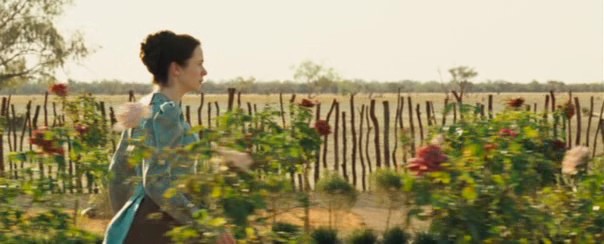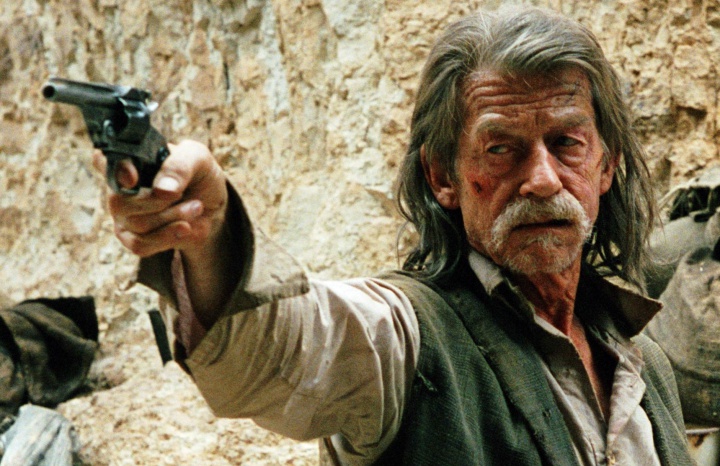The Proposition:"Sweat, brutality & death"
- eclectic Stefan

- Jul 5, 2021
- 3 min read
Updated: Dec 4, 2021


Celebrate NAIDOC Week
NAIDOC Week is an Australian observance lasting from the first Sunday in July until the following Sunday. NAIDOC stands for National Aborigines and Islanders Day Observance Committee. It has its origins in the 1938 Day of Mourning, becoming a week-long event in 1975.
Aboriginal and Torres Strait Islander people should be aware that this website contains an image of a deceased person.
Vale David Gulpilil Ridjimiraril Dalaithngu (1953? - 29 November 2021)
The Proposition (2005)
The Australian landscape has featured prominently in many Australian films. That landscape takes a commanding, almost overwhelming, role in The Proposition.
The Proposition is set in colonial Australian. An English law enforcement officer is in charge of a desolate town in remote Australia.
He has taken it upon himself to civilise the country and its citizens.
He and his wife attempt to make a small corner of Australia forever England.
It is made all the more difficult by his battle with a gang of outlaw brothers.
One of the brothers has brutally murdered a family of settlers.
The proposition offered by the lawman is that the bushranger must kill his murderous brother, who is hiding in the bush, in order to save his captured younger, innocent and emotionally immature brother from the gallows.
It poses an ethical dilemma for the brother.

The imagery of violence is uncompromising. It stands in contrast to the refined and civilised behaviour of the English couple in their dwelling with its English rose garden.
The Proposition will leave you with the smell of sweat and the discomfort of searing heat in your synapses along with an enormous thirst and the desire to immediately brush your teeth.
It is an assault on your senses.
The Proposition is one of the most effective evocations of landscape committed to the cinema screen. The landscape echoes the conflict between settlers and lawmen, nature and humans.
It is a brutal, savage, and raw depiction of life in colonial Australia.

The Depiction of Indigenous Cultures in The Proposition
Three acclaimed Indigenous Australian actors (David Gulpilil, Tom E. Lewis and Leah Purcell) have supporting roles in the film.
In the behind-the-scenes features included on The Proposition DVD, the indication is that the film is regarded as uncommonly accurate in depicting indigenous Australian culture of the late 19th century, and when filming in the outback, the cast and crew took great pains to follow the advice of indigenous consultants.
from Wikipedia
Photographs of white-settler families are interspersed with Aboriginal Australians in chains. The latter photographs rather misguidedly signal the film’s engagement with indigenous issues and the atrocities committed against them by the white settlers.
Cave’s motivation for writing the film script was that the subject of black resistance had not been given adequate representation in other Australian films and it was his intention to correct this absence. This absence, however, remains strikingly present in The Proposition.
from Portraits of Settler History in The Proposition by Carol Hart (2006), sensesofcinema.com
Image from The Proposition
READ THE COMPLETE ARTICLE: Portraits of Settler History in The Proposition
FURTHER READING available from AIATSIS (Australian Institute of Aboriginal and Torres Strait Islander Studies)
Felicity Collins, 2008
Discusses the role of allegory in the representation of Australian colonial history; debates on the role of historians and historical fiction - Grenville's The Secret River; modernist truth in history and historical allegory; includes reference to the representation of Aboriginal people as victims of colonial violence in the films The Proposition and The Tracker.
Official trailer The Proposition
FILM EXTRAS

The Tracker (2002)
When a white woman is murdered in 1920s Australia, a police officer (Gary Sweet) ventures into the outback with a small crew in search of the Aboriginal fugitive (Noel Wilton) accused of the crime. In his group are a newcomer to the country (Damon Gameau) and an indigenous tracker (David Gulpilil), who is not fully trusted by the racially prejudiced officer. As the pursuit through this dangerous territory drags on, tensions begin to rise.
WATCH The Tracker
Available to Rent/Buy on Apple TV+ & Prime Video. Check availability in your region.
Australian Film Institute Awards
Winner
Best Actor in a Supporting Role: David Gulpilil
Nominees
Best Film Rolf de Heer & Julie Ryan; Best Direction Rolf de Heer; Best Cinematography Ian Jones; Best Original Screenplay Rolf de Heer; Best Editing Tania Nehme
FURTHER READING available from AIATSIS (Australian Institute of Aboriginal and Torres Strait Islander Studies)
Disputing history, remembering country in 'The Tracker' and 'Rabbit-Proof Fence' , Felicity Collins & Therese Davis, 2006
Analysis of the films 'Rabbit-Proof Fence' and 'The Tracker', their revival of familiar figures, the lost child and the black tracker, and their role in the history wars; included in the discussion is that the role of film in the reconciliation process has been misunderstood and the stolen generations.
Acknowledgement of Country
Screen Speak acknowledges the Traditional Custodians of country throughout Australia and their connections to land, sea and community. We pay our respect to their elders past and present.













